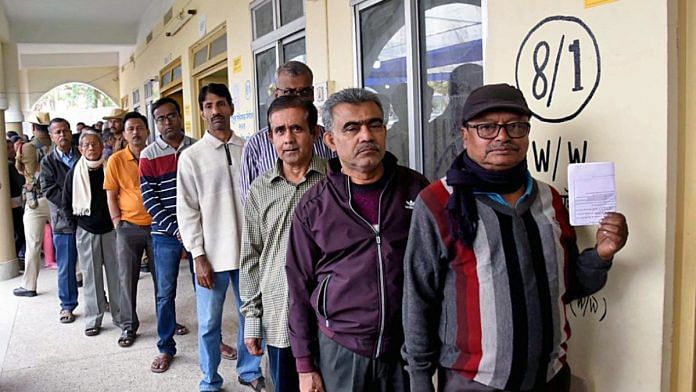
Thank you dear subscribers, we are overwhelmed with your response.
Your Turn is a unique section from ThePrint featuring points of view from its subscribers. If you are a subscriber, have a point of view, please send it to us. If not, do subscribe here: https://theprint.in/
India is a country of many elections. At any given time, someone casting vote somewhere in the country. With the system adopted by our constitution of first past the post, addressing issues of various interest groups which can make elections win is of paramount importance for those contesting them. Although there is nothing wrong in this system of electing representatives – I guess there is theorem in political science that no voting system is free of flaws – it keeps cast based voting and cast based reservations alive at all times.
Caste based reservations are increasingly becoming an issue of contention from both sides, by those advocating merit and by those advocating cast. It is true that the effects of generations of social discrimination cannot be undone in 100 years. But after 75 years of independence, if we are still bringing more and more caste groups under the ambit of reservation or putting up data how SC/ST are underrepresented drastically in IITs, government jobs or higher education, something is not working and a course correction is required.
People from different background and surroundings have different experience of caste-based discrimination. For someone like me who has lived and studied in Mumbai, and that too in an upper caste, it is difficult to empathise with someone who has lived in rural area under harsh social and economic conditions. However, I have seen young students from upper castes for whom it does not matter if a friend is from SC/ST/OBC category in normal life; change their attitude once competition gets stiffer in education parlance. When they experience that a friend with much lesser score can get admission for a course because of caste and, that the friend’s social background (or shall we call it economic status?) till that day was never any lesser than that of theirs, suddenly caste matters and bitterness creeps in. News of alleged caste discrimination in IIT-B is vindication of this contention.
The constitutional criteria for backwardness is only social and hence cast. Economic status of an individual is not a reason for denying reservation to SC/ST. Here I am not talking about OBC groups, for which creamy layer concept is in place. So, we give them reservation in education and jobs. What does change in the life of a candidate due to this reservation? It is the economic status that we thrive to change and assume that this will also alleviate social status. We need to take cognizance of this fact and make changes accordingly.
Why can we not assume that a person of say, Class I officer status has already risen in social ladder and then deny any further reservation to his/her children? Or if someone has availed of reservation till the level of graduation and in getting a job for 2 generations then, he/she cannot avail of any further reservation?
Other possibility is differentiating level of reservation at different levels. Similar to promotion concept in the armed forces, where after certain rank, criteria is not the seniority but the merit, different reservation level can be adopted at different education and job level. We all know the importance of primary education. Let’s have 70% reservation and also other benefit schemes for all backward casts in primary and secondary education. Percentage can be reduced to 50% in higher secondary and to 30% for under-grad. Entry level reservation in job and promotion to be similarly differentiated.
There is no denying the fact that cast differences do exist and every once in a while, we read horrible news of violence inflicted upon backward casts. With increasing privatisation and reduction in government jobs, reservation in jobs is becoming less and less effective. But as economists say, “free market is efficient but not equitable”, we have to make special efforts to make society equitable. Increasing reservation to more and more cast groups is not helping, in fact it is making the divide deeper. What we need is course correction. Not to reduce reservation but alter the criteria for benefits and ensure truly backward get the benefit and not just those who have already risen above the backwardness threshold.
We are fortunate that someone of Bharat Ratna Dr. B R Ambedkar’s intellect and vision lived amongst us. He has written about three kinds of inequalities. Physical Heredity, social inheritance and endowment, and person’s own efforts. When we are trying to reduce inequality due to social inheritance, some inequality will creep in towards the rewards one gets due to person’s own efforts. This is what has been termed as reverse discrimination. But time has come to take a stock of cost incurred due to this and benefits received. If there a is mismatch, course correction is required.
All said, I doubt if this will even be discussed in open forum – due to our election process.
Also read: SubscriberWrites: Social justice needs an upgrade. Decadence has seeped in everyday life
These pieces are being published as they have been received – they have not been edited/fact-checked by ThePrint.

COMMENTS